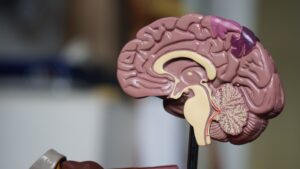A new study has suggested a link between ‘good cholesterol’, usually considered in terms of heart disease, and brain health.
Researchers at the Keck School of Medicine, at the University of Southern California (USC), took samples of cerebrospinal fluid from people aged 60 and over and measured the amount of small high-density lipoprotein (HDL) – sometimes dubbed ‘good cholesterol’ – particles in each sample.
The team found that a higher number of these particles in the fluid is associated with two key indicators that the particles might have a protective effect against Alzheimer’s disease.
One indicator is better performance on cognitive tests. The other indicator is higher circulating levels in the cerebrospinal fluid of a particular peptide — like a protein, but smaller — called amyloid beta 42. Although that peptide contributes to Alzheimer’s disease when it misfolds and clumps onto neurons, an increased concentration circulating around the brain and spine is linked to lower risk for the disease.
‘This study represents the first time that small HDL particles in the brain have been counted,’ said Hussein Yassine of the Keck School of Medicine. ‘They may be involved with the clearance and excretion of the peptides that form the amyloid plaques we see in Alzheimer’s disease, so we speculate that there could be a role for these small HDL particles in prevention.’

The researchers recruited 180 healthy participants with an average age of nearly 77 and analysed samples of their blood plasma and cerebrospinal fluid. Using a sensitive technique known as ion mobility, the researchers identified and measured the size of individual HDL particles. A subset of 141 participants also completed a battery of cognitive tests.
Of the participants who took the cognitive tests, the ones with higher levels of small HDL particles in their cerebrospinal fluid performed better, independent of their age, sex, education or whether or not they carried the APOE4 gene, which puts them at higher risk for Alzheimer’s disease.
The correlation was even stronger among those who had no cognitive impairment. The evidence suggests that these HDL particles may be key to finding treatments that would work early in the disease process, long before cognitive decline occurs.
‘What we’re finding here is that before the onset of cognitive impairment, these oils — these small HDL particles — are lubricating the system and keeping it healthy,’ said Yassine. ‘You’ve got a time to intervene with exercise, drugs or whatever else to keep brain cells healthy. We still need to understand the mechanisms that promote the production of these particles, in order to make drugs that increase small HDL in the brain.’
Photo by Robina Weermeijer















